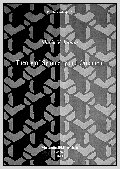
This book represents a comparative analysis of the theory of discrete and visually presentable continuous symmetry groups in Euclidean plane E2 or in E2\{O}: Symmetry Groups of Rosettes, Friezes, and Ornaments (Chapter 2), Similarity Symmetry Groups in E2 (Chapter 3), Conformal Symmetry Groups in E2\{O} (Chapter 4) and ornamental motifs found in ornamental art that satisfy the mentioned forms of symmetry.
In each chapter symmetric forms are treated from the theory of groups point of view: generators, abstract definitions, structures, Cayley diagrams, data on enantiomorphism, form of the fundamental region... The analysis of the origin of corresponding symmetry structures in ornamental art: chronology of ornaments, construction problems, visual characteristics, and their relation to geometric-algebraic properties of the considered symmetry is given. The discussion is followed by illustrations, such as Cayley diagrams and ornaments.
The most of ornamental examples in the book date from prehistoric or ancient cultures. By iterpreting the ornamental art "as the oldest aspect of higher mathematics given implicitly", the emphasis is on the path leading from the theory of symmetry (i.e., the derivation, classification and analysis of symmetry groups) toward ornaments understood as the visual interpretations of abstract geometric-algebraic structures and vice versa. Such an approach is becoming increasingly more important, since it makes possible the use of visually presented symmetry groups in all fields of science and art where there is a need for the visual representation and analysis of symmetry structures (Mathematics, Crystallography, Physics, Chemistry, Biology, Applied Arts, Archaeology, Design, Architecture, Visual Arts).
1. Introduction
2. Theory of Isometric Symmetry Groups in E2 and Ornamental Art
3. Similarity Symmetry in E2
4. Conformal Symmetry in E2\{O}
5. Theory of Symmetry and Ornamental Art
Published by MATHEMATICAL INSTITUTE, Belgrade, 1995
331 pages, 171 illustrations, paperbound, $30